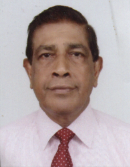 Name: Nimal de Silva
Name: Nimal de Silva
Age: 65
Company: Global Surgical Products (PTE) LTD / Suntec Electronics LTD
Industry / Markets: Medical Supplies / Japan
Location: Colombo, Sri Lanka
Interviewed: October 1, 2011
Stage: Mature
1) Where were your born? What is your level of education?
Born in Sri Lanka. College educated in Sri Lanka. I attended Richmond College in Galle, Sri Lanka. It’s a private school started in 1875 by British missionaries. During our college days there was only one state university which was the University of Ceylon. Diploma in Industrial Management in Tokyo at the Tokyo Institute of Technology.
2) Tell me about your work experience. Have you always been an entrepreneur? Please provide a brief resume.
While in Japan, I have worked for a large industrial conglomerate named Fuji Heavy Industries Ltd. as an Assistant Engineer. While working I got the motivation that I would someday have my own industry in Sri Lanka. In 1985, I came back to Sri Lanka with the family and started a small industry with the help of a Japanese friend with 20 workers.
Today it has about 200 workers.
3) What is the name of your current company(ies)? Have you started more one company? If so, list them here and years in business.
Global Surgical Products Limited – 1985 (26 years)
Suntec Electronics Limited – 1997 (14 years)
4) What is your industry? Who are your target customers?
Global Surgical Products manufactures surgical material such as different types of bandages & gauze products, etc. Suntec Electronics manufactures semiconductors. The entire production of both industries is exported to Japan.
5) Which countries do you conduct business? Is it regional such as Asia, Africa or the Middle East?
Only Japan. Our buyers have given us the technical know-how and we work on a buy-back agreement.
6) Have you always lived in Sri Lanka? Does your business have offices or other facilities abroad in other countries?
I have lived for 16 years in Japan. Rest of the life in Sri Lanka. We do not have our own offices in Japan, but we have 2 agents for the two industries. They work very closely with us giving us necessary information and placing their monthly orders with us.
7) Sri Lanka has had a Civil War for the nearly 26 years and, now, this conflict has finally ended in 2009. How (if at all) has this impacted your business?
We lost a large volume of business during the war mainly because of delays at the airport / harbour. Now, the situation is very much better.
8) What is your typical day like? When do you arrive at the office? Do you work from home? How often do you take vacation? I want to know how you manage your time and personal life.
My day starts at 6 in the morning when I get up. At 8’clock I leave home for work and get to my office at 9’clock (1-hour drive). I have a staff meeting on Mondays. I leave the office about 4:30 in the evening.
My work is mainly communication with the buyers in Japan. All other administrative work, HR work, production work, maintenance work and R&D work, etc. have separate managers-in-charge. As such, I do not have to go to office every day. I go on Monday, Wednesday and Friday only. Other days I work from home when a necessity arises. After 3 in the afternoon, I go to play golf as Japan is 3 1/2 hours ahead of us.
9) What is the vision for your company? For example, do you want to capture a certain market share? Or be the best at something? Where do you want to see yourself in the future, 5, 10, 20 years from now?
Our vision is to create a good reputation among Japanese buyers as a very reliable outsourcing agent. So that in the future they will bring in business.
10) What is your definition of success?
I always say: Be happy with what you have. But don’t be satisfied.
11) How do you stay motivated when things get tough?
I believe in self confidence. Everything has one or more alternatives. Stay cool and pick up the best.
12) Are there any books you are currently reading? They don’t have to be business books, they can be philosophical.
I read a lot of international magazines. They provide a wide range of information about current affairs.
13) Are there any books that you’ve read in your life that have had a major impact, that have captivated you or inspired you?
Yes. While in Japan I read a book about Mr [Soichiro] Honda, the founder of Honda Motors Ltd. and also a book written by Mr [Hiroaki] Aoki, a very successful restaurant chain owner about how he started the business.
14) What is something you would share with other aspiring entrepreneurs? Any words of wisdom?
To give proper guidance to the workforce which is the back-bone of the enterprise.
15) Final question: Is there anything else you’d like to share? It can be anything I haven’t asked that you feel is important.
In my case, I have confidence in my workforce from top to bottom. I am loyal to them. In return, they are loyal to the place of work. They look after the enterprise when they are looked after well. A stress free work environment is what everybody needs.

